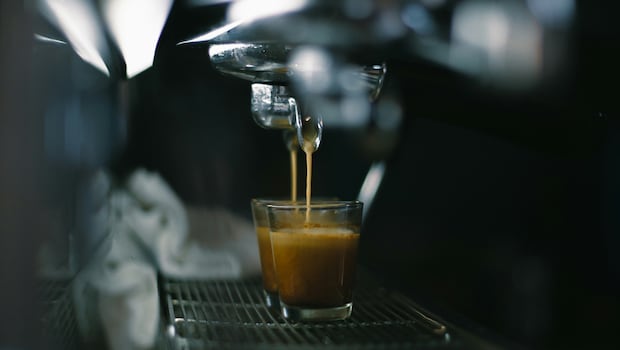Every morning, as dawn breaks and birds chirp, millions wake up to the sound of espresso machines steaming milk, moka pots clanging over the stove, and the aroma filling their homes. Brewing coffee is not just another task; it is a ritual which plays a pivotal role in our lives. From often being a first romantic date to fuelling high-powered business meetings, coffee has been an integral part of our routines. Yet, beneath its universal appeal lies a complex history, vibrant evolution, and ongoing debate about what defines a "good" coffee.
The Origins of Coffee
Coffee's rich history is intricately woven with captivating stories. The legend of Kaldi and his lively goats offers a glimpse into coffee's origins. Discovered in the Ethiopian wilderness, coffee seeds began their journey across the globe. Cultivated beneath Arabian skies, they became a beverage of the elite in Yemen, later gracing Venetian palazzos, and eventually energising American cities. Over time, coffee evolved-from a mystical Sufi potion in the Middle East to a symbol of European refinement, and ultimately, an emblem of American enterprise and innovation.
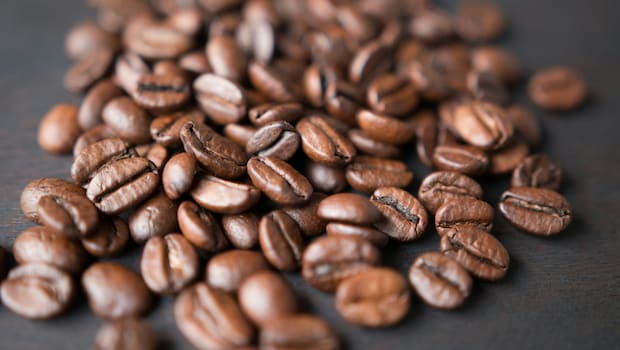
Coffee was first discovered in the 15th Century. Photo: Unsplash
Coffee's Journey Across Continents
By the 17th century, coffee reached Europe, initially met with scepticism and debate. However, it quickly rose in popularity, leading to the emergence of coffeehouses across the continent. In England, these venues were dubbed "penny universities," where, for a penny, one could access a wealth of knowledge and conversation. Notable London coffeehouses, such as Lloyd's, eventually evolved into major institutions like Lloyd's of London.
Also Read: 6 Genius Tips To Get Filter Coffee Froth Like A South Indian Cafe
By the 18th century, coffee crossed the Atlantic to the New World. The Boston Tea Party in 1773, protesting British tea taxes, solidified coffee as a patriotic choice in the United States. Coffee's popularity surged further in the 19th century, bolstered by innovations such as the percolator and the rise of large coffee enterprises. This transatlantic journey connected European roots with the growing American culture of coffee consumption.
Coffee Around the World
Coffee is embraced globally in diverse ways, reflecting local tastes, traditions, and rituals. In Turkey, it is finely ground and unfiltered, producing a rich, robust drink where the grounds settle at the bottom. In the Middle East, Arab coffee is infused with cardamom, a nod to the ancient spice trade and the region's storied history. Italy offers espresso, a quick, potent shot reflecting fast-paced Italian city life. Ethiopia's coffee ceremony is a spiritual, communal experience symbolising respect and friendship.
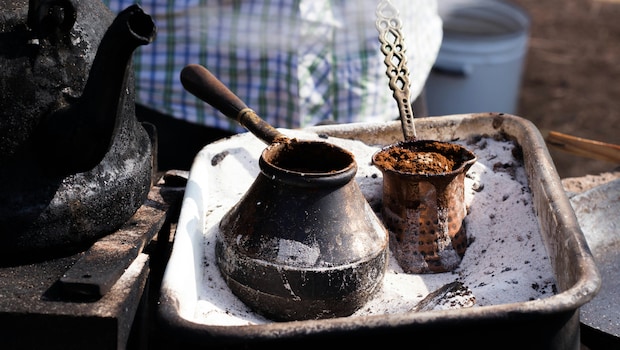
Turkish coffee is brewed over hot sand. Photo Credit: Unsplash
Coffee Culture in India
India has its own thriving coffee legacy, with cultivation dating back to the 17th century in the Western Ghats. The hill stations of Karnataka, Kerala, and Tamil Nadu became centres for coffee plantations, producing beans prized for their distinctive flavour. South Indian filter coffee, served with frothed milk and a strong, aromatic brew, has become a cultural staple, often enjoyed daily in homes and cafés alike.
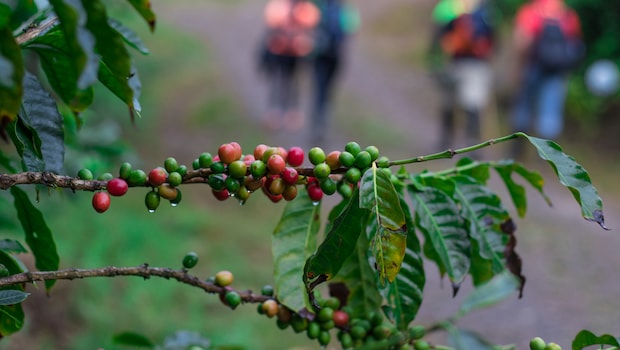
Coffee harvesting in Coorg. Photo: iStock
Beyond tradition, India's modern coffee scene has grown rapidly. Cities such as Bangalore, Chennai, and Mumbai host speciality cafés and artisanal roasters, blending local beans with global brewing techniques. From café chains to boutique coffee shops, Indian coffee culture now bridges heritage and contemporary trends, offering everything from traditional filter coffee to single-origin brews, cold brews, and espresso-based drinks.
Also Read: International Coffee Day: 5 Best Coffee Recipes To Celebrate With
Latin America, home to some of the largest coffee producers, has shaped the global coffee trade for centuries. Colombian and Brazilian coffees are celebrated for their consistency, aroma, and flavour profiles. In Japan, coffee culture has evolved uniquely, with siphon brewing and speciality cafés emphasising precision and presentation. South Korea has emerged as a coffee hub, boasting cafés ranging from floral themes to vintage vinyl collections. Here, café culture emphasises aesthetics, experience, and memory-making.
Across continents, coffee is not merely a beverage; it is a blend of history, anthropology, and art in a cup, celebrated in myriad forms worldwide.
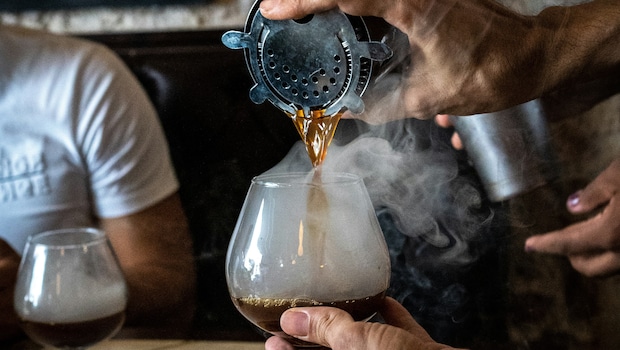
Carajillo from Epoca in Cartagena, Colombia. Photo Credit: Unsplash
Coffee in Culinary Creations
Coffee's influence extends beyond the cup, shaping culinary experiences across the globe. In Italy, the aroma rises not only from espresso machines but also from dessert displays featuring tiramisu. The coffee-soaked ladyfingers nestled between layers of creamy mascarpone illustrate coffee's dual role as both a centrepiece and flavour enhancer in culinary art.
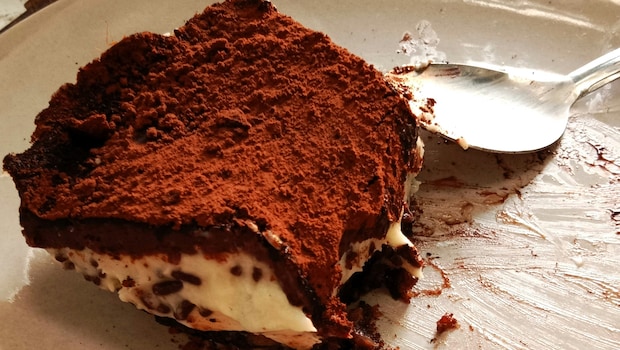
Tiramisu is a coffee-based Italian dessert. Photo Credit: Unsplash
This journey continues beyond Europe. In Mexico, amid the vibrant blend of chillies, chocolate, and spices in a traditional mole, coffee adds subtle depth, enhancing other flavours. In Australia, backyard barbecues, a cultural staple, have adopted innovative twists. Dry rubs composed of spices and herbs often include finely ground coffee, producing a smoky, charred flavour profile with hints of coffee's roasty character. Coffee also plays a starring role in beverages beyond espresso, from lattes to cold brews and even coffee cocktails, showing its versatility in global culinary practices.
Also Read: Love Coffee? 3 Ways To Make Coffee Flavoured Cold Beverages For Summer
Modern Coffee Movements
'The Third Wave Coffee' movement has transformed the barista's role, emphasising transparency, sustainability, and craftsmanship. Once merely counter attendants, baristas now serve as coffee sommeliers, possessing extensive knowledge of bean origins, processing methods, and brewing techniques.
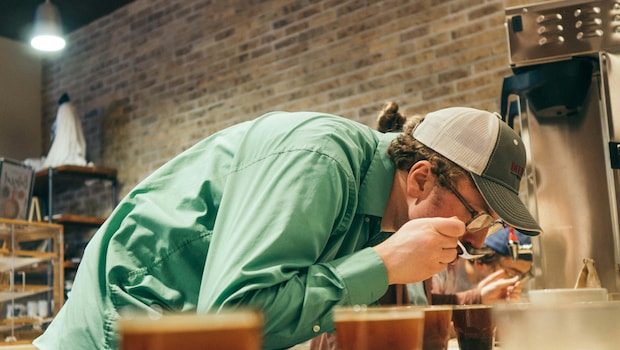
Photo Credit: Unspalsh
Their expertise extends beyond crafting the perfect cup to educating consumers. They can identify berry notes in Ethiopian brews or chocolate hints in Colombian roasts. Conversations often delve into bean cultivation, rain shadow effects, or the nuances of wet versus dry processing.
The Future of Coffee Culture
Modern coffee enthusiasts seek not just a beverage but a story, a connection, and an experience. Cafés have become knowledge hubs, where discussions encompass taste, terroir, trade ethics, and techniques, bridging centuries of coffee history with contemporary culture. Emerging Fourth Wave Coffee trends focus on sustainability, innovative blends, and technological integration, signalling an exciting future for coffee lovers around the world.










